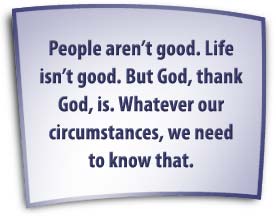
n ex-boyfriend once accused me of being too nice. He was imparting a rather negative commentary about someone we both knew in college, and I leaped to the person’s defense. After I shared my line of reasoning he shook his head and, bemused, said, “You always do that—try to find the good in people—find the silver lining. That doesn’t always work. People aren’t good . . .” With a sigh and a smile we both moved on to other topics. Not much later, we both moved on to other relationships.
In the years that have ensued, I’ve come to realize we were both right. People aren’t good. Not only are we weighed down (as individuals) with sin, but the sinking stone of suffering also keeps us struggling below the surface. We hurt each other; we hurt ourselves. We are sinful creatures mired in a sinful plane. To rephrase John 1:46: “Can anything good come from Earth?” Here’s where my “silver lining” finds the light of day. What good can come from Earth? When Christ is in us, plenty.

People aren’t good, but many times they do have good intentions. And lots of times I’ve seen and experienced for myself the goodness in humanity. What prompts some to rush into harm’s way to save another? What gets some to give when there’s no tangible return benefit? Remember the New Yorker who dived on top of a teen on the subway tracks as a train approached (see www.usatoday.com/news/nation/2007-01-02-subway-rescue_x.htm)? Why did he do that? Simply put: it’s God. This affirmative influence comes directly from Christ—regardless of who or what a person follows. The atheist, who endeavors to live an environmentally friendly life, or the Buddhist, who treats others as graciously as he/she wants to be treated, is influenced by the Savior, whether they recognize it.
So what does this have to do with Thanksgiving? There is so much suffering in our world. So much sadness. So much sickness. So much evil. People aren’t good. Life isn’t good. But God, thank God, is (Matt. 19:17). Whatever our circumstances, we need to know that. And every person on the planet needs to know it, too. It is our duty to spread the word.
Please don’t misunderstand. I’m not talking about the metaphoric patronizing tap on the head that most of us have received at one time or another. You know what I mean. Something horrible happens, almost unimaginable, and a well-meaning person likens your experience to something that happened to them (“I stubbed my toe the other day and could not believe the pain, so I know how you must feel about your double amputation from that car accident”) and finishes up their attempt to bolster with a “be thankful . . . God still loves you.” Some are so entrenched in their horrors that this comes across as unsympathetic, disingenuous, unctuous, trite . . . And it is.
Please, don’t do it. Just as we don’t know another person’s heart, we don’t know the depth of their suffering. We can come close, in some cases, to understanding—and certainly there are times we can commiserate—but we cannot know.
As we follow Jesus and minister to humanity, as we tell the world that God is good, as we show glimpses of His goodness—as we teach the world (and ourselves) that despite all we can thank God—it is crucial to remember that suffering and thanksgiving exist in the same universe and we must exude care in how we address them. We must remember that while we may be the rope, we aren’t the buoy.
We can try to find the silver lining in circumstances, in people, recognizing that we aren’t it. Can anything good come from Earth? Only if Christ dwells within. And thank God for that. This Thanksgiving, and always.
_________
Kimberly Luste Maran is an assistant editor of the Adventist Review.

 People aren’t good, but many times they do have good intentions. And lots of times I’ve seen and experienced for myself the goodness in humanity. What prompts some to rush into harm’s way to save another? What gets some to give when there’s no tangible return benefit? Remember the New Yorker who dived on top of a teen on the subway tracks as a train approached (see www.usatoday.com/news/nation/2007-01-02-subway-rescue_x.htm)? Why did he do that? Simply put: it’s God. This affirmative influence comes directly from Christ—regardless of who or what a person follows. The atheist, who endeavors to live an environmentally friendly life, or the Buddhist, who treats others as graciously as he/she wants to be treated, is influenced by the Savior, whether they recognize it.
People aren’t good, but many times they do have good intentions. And lots of times I’ve seen and experienced for myself the goodness in humanity. What prompts some to rush into harm’s way to save another? What gets some to give when there’s no tangible return benefit? Remember the New Yorker who dived on top of a teen on the subway tracks as a train approached (see www.usatoday.com/news/nation/2007-01-02-subway-rescue_x.htm)? Why did he do that? Simply put: it’s God. This affirmative influence comes directly from Christ—regardless of who or what a person follows. The atheist, who endeavors to live an environmentally friendly life, or the Buddhist, who treats others as graciously as he/she wants to be treated, is influenced by the Savior, whether they recognize it.